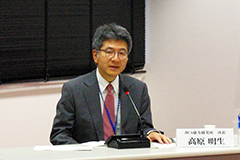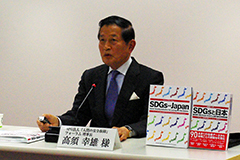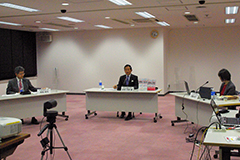The 7th Knowledge Forum: Making Issues Visible Through Human Security Indicators, to Create a World Where Every Person Has Dignity
2021.06.23
On March 31, 2021, the JICA Ogata Sadako Research Institute for Peace and Development (JICA Ogata Research Institute) held the 7th Knowledge Forum, entitled "Re-examining 'Human Security' in an Era of Global Crisis: Viewing the World and Japan through Human Dignity Lens,” in a webinar format.
The JICA Ogata Research Institute published an English-language book, “SDGs and Japan: Human Security Indicators for Leaving No One Behind,” in November 2020. Jointly translated by Takasu Yukio, president of the NPO "Human Security" Forum/Special Advisor to the Secretary-General of the United Nations on Human Security, and the JICA Ogata Research Institute, it is an English version of the book "Zenkoku Data: SDGs to Nihon, Daremo Ga Torinokosarenai Tame no Ningen no Anzen Hosho Shihyou,” published by Akashi Shoten. To commemorate this occasion, the Institute invited Takasu to discuss human security with a focus on dignity at the Knowledge Forum.

Director Takahara Akio gave his opening remarks
In his opening remarks at the start of the Forum, Takahara Akio, director of the JICA Ogata Research Institute, said, “The concept of human security is the foundation of the Sustainable Development Goals (SDGs), which aim to create a world in which every individual has the right to live with dignity. Its importance is apparent. However, in the time of the new crisis of the COVID-19 pandemic, once again, it is important to have an in-depth discussion regarding the issues surrounding human security, human dignity, and what our future policies and projects should be.”
After the opening, Takasu, who gave the keynote speech, cited the reasons for publishing the book. “When the SDGs were adopted by the United Nations in 2015, I was working at the UN Secretariat. However, when I returned to Japan in 2017, I was surprised to find at the time that the SDGs were only viewed in Japan from an international cooperation perspective. The SDGs include issues not only for developing countries, but also for developed countries, which means that they are also issues for Japan itself. I wanted to broaden people's understanding that the SDGs are a way for us to look at ourselves, society, and the Earth from the perspective of each individual, and that the true meaning of the SDGs lies in their aim to ensure the dignity of each and every person.” He also pointed out that the purpose of the SDGs is not achieving the 17 goals and 232 indicators in and of themselves, but aiming to bring about a society where no one is left behind. The book introduced a new approach to visualizing the people who are being left behind, and where they are located, by establishing 91 human security indicators and collecting statistical data at the level of Japan's 47 prefectures to conduct comprehensive comparisons. In particular, Takasu emphasized that attempting to take "human dignity"—which is difficult to quantify—and make it visible, as well as incorporating subjective assessments of self-sufficiency, isolation, and social connectedness in addition to objective data, was groundbreaking, saying that the Human Security Indicators “became a template for localizing the principles of the SDGs.” Specifically, the book quantified each of the "life indicators" in the areas of life and health, "livelihood indicators" in the areas such as the economy, employment and education, and "dignity indicators" in the areas like violence against children and women and trust in the public sector, then compared them. The result was that the overall index in the Hokuriku and Chubu regions was high, and low in the Tohoku and Hokkaido regions. However, there was a large discrepancy between the results for objective and subjective indicators. For example, Toyama Prefecture was ranked second in the nation in the objective overall index, but 38th in the subjective index of self-sufficiency. Takasu said that it is essential to conduct surveys as close to the residents as possible, at the municipal level. After introducing the results obtained by the indicators from 35 municipalities in Miyagi Prefecture, he said, "The measurement of dignity has received high praise from the United Nations Development Program (UNDP), and there are moves to expand the human security indicators to places such as Africa and Latin America," concluding that "In order to achieve the SDGs, it is essential to provide evidence through data."

Takasu Yukio, president of the NPO "Human Security" Forum/Special Advisor to the Secretary-General of the United Nations on Human Security
The speech was followed by a talk session by Takasu, Takahara, and JICA Ogata Research Institute Executive Senior Research Fellow Muto Ako, who served as facilitator. In response to Takahara, who commented that "I believe that human dignity can only be realized when there is peace and prosperity as a base; however, looking around at the current state of international relations, we may be at a point where it is questionable whether or not that peace can be sustained," Takasu replied, "While this is a fundamental and difficult issue, national security and human security are compatible and complementary. It is precisely because we live in an age of many obstacles, which is also referred to as democratic backsliding, that the perspective of human security, which aims to secure the ‘life, livelihood and dignity’ of all people, is necessary.” Furthermore, Takasu said, "Dignity begins with the idea that the very act of being born into this world as a human being has a value that cannot be given up. Figuring out how to measure this is a real challenge, and statistics in this field are difficult to obtain at the municipal level. However, it is important to recognize the importance of evidence, to know about the priority issues in each region, and to find solutions. This should be applicable to the field of international cooperation." Takahara also stated, "I think that if we have diverse criteria for evaluating people, it could lead to the realization of a society where each and every person can be proud of themselves.”

Takasu, Takahara, and JICA Ogata Research Institute Executive Senior Research Fellow Muto Ako had a talk session
During the question and answer session, participants exchanged opinions on a variety of topics, including "What kind of infrastructure and systems need to be developed to realize a society that protects human dignity?" and "How can human security be applied to cases where the government does not protect its own citizens?”
JICA Ogata Sadako Research Institute for Peace and Development Knowledge Forum:
In January 2019, the JICA Ogata Research Institute launched the Forum as a venue for unfettered discussion on international development by engaging people from diverse backgrounds and perspectives. The Forum aims to serve as a knowledge co-creation platform to facilitate the sharing of knowledge on development cooperation with various stakeholders.

事業事前評価表(地球規模課題対応国際科学技術協力(SATREPS)).国際協力機構 地球環境部 . 防災第一チーム. 1.案件名.国 名: フィリピン共和国.

事業事前評価表(地球規模課題対応国際科学技術協力(SATREPS)).国際協力機構 地球環境部 . 防災第一チーム. 1.案件名.国 名: フィリピン共和国.

事業事前評価表(地球規模課題対応国際科学技術協力(SATREPS)).国際協力機構 地球環境部 . 防災第一チーム. 1.案件名.国 名: フィリピン共和国.

事業事前評価表(地球規模課題対応国際科学技術協力(SATREPS)).国際協力機構 地球環境部 . 防災第一チーム. 1.案件名.国 名: フィリピン共和国.

事業事前評価表(地球規模課題対応国際科学技術協力(SATREPS)).国際協力機構 地球環境部 . 防災第一チーム. 1.案件名.国 名: フィリピン共和国.
scroll